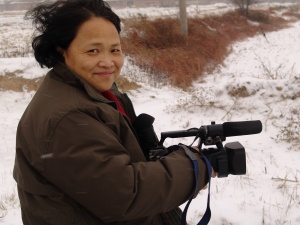“Ai Xiaoming”的版本间的差异
来自China Digital Space
| 第11行: | 第11行: | ||
Ai was born in the southern city of Wuhan in 1953. She earned her bachelor's in Chinese from Central China Normal University in 1981 and her Ph.D. in Modern Chinese Literature from Beijing Normal University in 1987. She was the [https://zh.wikipedia.org/wiki/%E8%89%BE%E6%99%93%E6%98%8E#.E7.AE.80.E5.8E.86 first woman after the Cultural Revolution to earn her doctoral degree in literature]. Ai taught at Lingnan University and the Chinese University of Hong Kong before joining the faculty at Sun Yat-sen University in 1995, where she stayed until her retirement in 2014. | Ai was born in the southern city of Wuhan in 1953. She earned her bachelor's in Chinese from Central China Normal University in 1981 and her Ph.D. in Modern Chinese Literature from Beijing Normal University in 1987. She was the [https://zh.wikipedia.org/wiki/%E8%89%BE%E6%99%93%E6%98%8E#.E7.AE.80.E5.8E.86 first woman after the Cultural Revolution to earn her doctoral degree in literature]. Ai taught at Lingnan University and the Chinese University of Hong Kong before joining the faculty at Sun Yat-sen University in 1995, where she stayed until her retirement in 2014. | ||
| − | In a 2016 interview with Ian Johnson, Ai said that she didn't participate in [http://chinadigitaltimes.net/2015/06/the-legacy-of-tiananmen-reaches-a-younger-generation/ Tiananmen protests], though she did visit the encampment several times. [http://chinadigitaltimes.net/2016/09/ai-xiaoming-didnt-realize-totalitarian-society/ Her activism began later], when she was a [http://news-archive.sewanee.edu/events/2008/03/18/ai-xiaoming-to-address-gender-equality-social-activism-in-china visiting professor at Seawanee | + | In a 2016 interview with Ian Johnson, Ai said that she didn't participate in [http://chinadigitaltimes.net/2015/06/the-legacy-of-tiananmen-reaches-a-younger-generation/ Tiananmen protests], though she did visit the encampment several times. [http://chinadigitaltimes.net/2016/09/ai-xiaoming-didnt-realize-totalitarian-society/ Her activism began later], when she was a [http://news-archive.sewanee.edu/events/2008/03/18/ai-xiaoming-to-address-gender-equality-social-activism-in-china visiting professor at Seawanee] in the U.S. between 1999 and 2000. She was inspired to research women's issues, which eventually drew her into China's [http://chinadigitaltimes.net/2014/05/ai-xiaoming-thinking-friends-prison/ once-vibrant circle of rights defenders]. The trip also turned her attention away from writing (she is the author of eight books and has translated many others) and towards documentary film making. |
Ai went on to translate and produce the "Vagina Monologues" at Sun Yat-sen and direct several [http://chinese.sysu.edu.cn/2012/User/216.aspx university projects in women's and sexuality studies]. She has also made films about [[Tan Zuoren]]'s investigation of the "tofu dregs schools" that collapsed in the [http://chinadigitaltimes.net/2009/12/video-tan-zuorens-sichuan-earthquake-investigation/ 2008 Sichuan earthquake], [http://screeningchina.blogspot.com/2010/09/evening-with-activist-documentary.html villagers in Henan Province infected with HIV after giving blood], the [[Shanwei form|2011 Wukan protests]], and many other cases of injustice. | Ai went on to translate and produce the "Vagina Monologues" at Sun Yat-sen and direct several [http://chinese.sysu.edu.cn/2012/User/216.aspx university projects in women's and sexuality studies]. She has also made films about [[Tan Zuoren]]'s investigation of the "tofu dregs schools" that collapsed in the [http://chinadigitaltimes.net/2009/12/video-tan-zuorens-sichuan-earthquake-investigation/ 2008 Sichuan earthquake], [http://screeningchina.blogspot.com/2010/09/evening-with-activist-documentary.html villagers in Henan Province infected with HIV after giving blood], the [[Shanwei form|2011 Wukan protests]], and many other cases of injustice. | ||
2017年2月10日 (五) 00:27的版本
艾晓明

Convert your grief into power; say everything you need to say; keep on walking the road you must travel.
—Ai Xiaoming, "Thinking of My Friends in Prison"
Ai Xiaoming is a documentary filmmaker, author, and women's rights activist. Ai has frequently collaborated with documentary filmmaker Hu Jie. She is professor emerita of literature and women's studies at Sun Yat-sen University in Guangzhou.
Ai was born in the southern city of Wuhan in 1953. She earned her bachelor's in Chinese from Central China Normal University in 1981 and her Ph.D. in Modern Chinese Literature from Beijing Normal University in 1987. She was the first woman after the Cultural Revolution to earn her doctoral degree in literature. Ai taught at Lingnan University and the Chinese University of Hong Kong before joining the faculty at Sun Yat-sen University in 1995, where she stayed until her retirement in 2014.
In a 2016 interview with Ian Johnson, Ai said that she didn't participate in Tiananmen protests, though she did visit the encampment several times. Her activism began later, when she was a visiting professor at Seawanee in the U.S. between 1999 and 2000. She was inspired to research women's issues, which eventually drew her into China's once-vibrant circle of rights defenders. The trip also turned her attention away from writing (she is the author of eight books and has translated many others) and towards documentary film making.
Ai went on to translate and produce the "Vagina Monologues" at Sun Yat-sen and direct several university projects in women's and sexuality studies. She has also made films about Tan Zuoren's investigation of the "tofu dregs schools" that collapsed in the 2008 Sichuan earthquake, villagers in Henan Province infected with HIV after giving blood, the 2011 Wukan protests, and many other cases of injustice.
Ai's films are banned in mainland China, and she is currently unable to leave the country. She was awarded France's 2010 Simone de Beauvoir Prize for her work on women's rights, but was not allowed to travel to receive the award. Still, Ai continues to produce films as a record of the "barbaric totalitarianism" she has witnessed in China today.
"Investigation by Citizens," Ai's film about the aftermath of the Sichuan earthquake, is available with English subtitles on her Vimeo account.
Ai Xiaoming at CDT
<feed url="feed://chinadigitaltimes.net/china/ai-xiaoming/feed/" entries="5">
- [{PERMALINK} {TITLE}] {DATE}, by {AUTHOR}
</feed>




